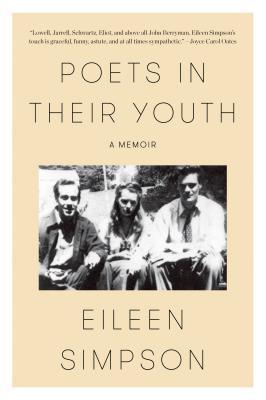In 1942, Eileen Simpson--then Eileen Mulligan--married John Berryman. Both were in their twenties; Eileen had just graduated from Hunter College and John had but one slim volume of poetry to his name. They moved frequently--from New York to Boston, then Princeton--chasing jobs, living simply, relying on the hospitality of more successful friends like Robert Lowell and Jean Stafford, or R. P. Blackmur and his wife, Helen. Rounding out their circle of intimates were other struggling poets like Randall Jarrell and Delmore Schwartz. Berryman alternately wrote and despaired of writing. Everyone stayed up late arguing about poetry.
Poets in Their Youth is a portrait of their marriage, yes, but it is also a portrait of a group of spectacularly intelligent friends at a particular time, in a particular place, all aflame with literature. Simpson's recollections are so tender, her narrative so generous, it is almost possible to imagine the story has a different ending--even as Schwartz's marriage crumbles, as Lowell succumbs to a manic episode, as her own relationship with Berryman buckles under the strain of his drinking, his infidelity, his depression.
Filled with winning anecdotes and moments of startling poignancy, Simpson's now classic memoir shows some of the most brilliant literary minds of the second half of the twentieth century at their brightest and most achingly human.

In 1942, Eileen Simpson--then Eileen Mulligan--married John Berryman. Both were in their twenties; Eileen had just graduated from Hunter College and John had but one slim volume of poetry to his name. They moved frequently--from New York to Boston, then Princeton--chasing jobs, living simply, relying on the hospitality of more successful friends like Robert Lowell and Jean Stafford, or R. P. Blackmur and his wife, Helen. Rounding out their circle of intimates were other struggling poets like Randall Jarrell and Delmore Schwartz. Berryman alternately wrote and despaired of writing. Everyone stayed up late arguing about poetry.
Poets in Their Youth is a portrait of their marriage, yes, but it is also a portrait of a group of spectacularly intelligent friends at a particular time, in a particular place, all aflame with literature. Simpson's recollections are so tender, her narrative so generous, it is almost possible to imagine the story has a different ending--even as Schwartz's marriage crumbles, as Lowell succumbs to a manic episode, as her own relationship with Berryman buckles under the strain of his drinking, his infidelity, his depression.
Filled with winning anecdotes and moments of startling poignancy, Simpson's now classic memoir shows some of the most brilliant literary minds of the second half of the twentieth century at their brightest and most achingly human.